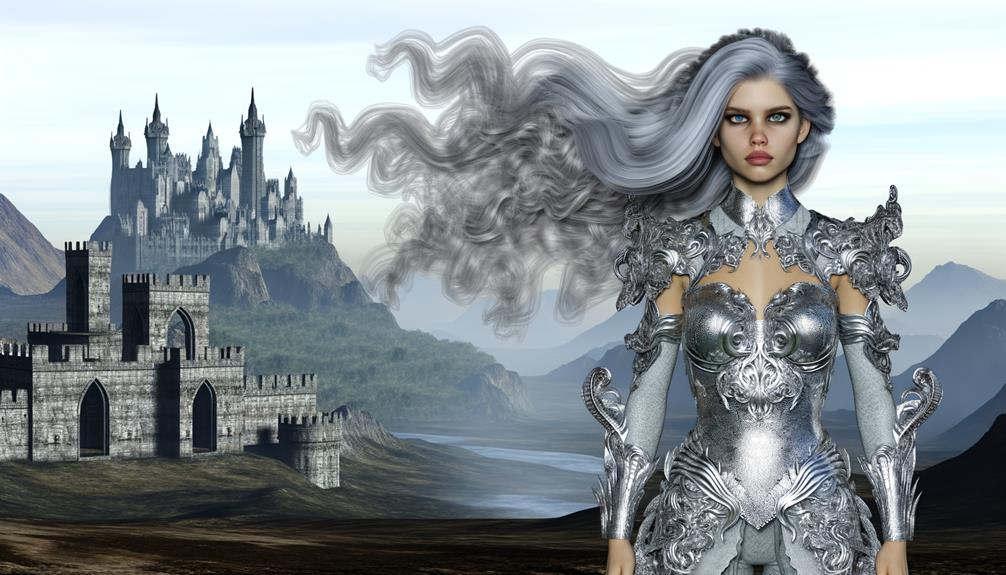Khaleesi Name Meaning and Origin
The name 'Khaleesi' originates from George R.R. Martin's *A Song of Ice and Fire* series.
It means 'queen' in the fictional Dothraki language, denoting significant authority and leadership. The term signifies Daenerys Targaryen's rise to power within the nomadic Dothraki tribe.
Its adoption has reshaped perceptions of female leadership and entered common vernacular. 'Khaleesi' has evolved from a fictional title to a real-world given name, demonstrating media's profound impact on language and cultural practices.
This transformation highlights the dynamic relationship between fictional narratives and real-life identity formation, offering deeper insights into the intersections of media and society.

Key Takeaways
- 'Khaleesi' originates from George R.R. Martin's *Game of Thrones* series.
- In the Dothraki language, 'Khaleesi' means 'queen.'
- The term signifies Daenerys Targaryen's leadership and authority among the Dothraki tribe.
- 'Khaleesi' has become a popular given name, inspired by the character's attributes.
- The name reflects the influence of media on modern naming practices.
The Birth of Khaleesi
The term 'Khaleesi,' originating from George R.R. Martin's acclaimed series 'A Song of Ice and Fire,' first appeared in the context of Daenerys Targaryen's storyline, symbolizing both her title and her rise to power among the Dothraki.
In the fictional Dothraki language, 'Khaleesi' translates to 'queen,' the feminine counterpart to 'Khal,' meaning 'king' or 'chieftain.' This title is not merely honorific but denotes Daenerys's authority and leadership within the nomadic tribe.
Her ascension to Khaleesi marks a significant transformation, representing her shift from a pawn in political machinations to a pivotal figure of influence and strength. This development underscores the importance of language and titles in shaping her identity and narrative trajectory.
Cultural Impact
Daenerys Targaryen's rise to Khaleesi profoundly influenced popular culture, reshaping perceptions of female leadership and inspiring a generation of fans and creators.
Her character, embodying strength, resilience, and ambition, became a symbol of empowerment, particularly for women. This transformation catalyzed a broader cultural shift, encouraging narratives that feature strong, complex female protagonists in various media, from literature to television.
The term 'Khaleesi' has transcended its fictional origins, entering everyday vernacular and informing discussions on leadership styles and gender roles. Merchandise, fan art, and even baby names have proliferated, underscoring the pervasive impact.
Additionally, Khaleesi's cultural resonance has prompted critical discourse on the portrayal of women in positions of power, influencing both creators and audiences alike.
Linguistic Significance
Khaleesi's linguistic significance extends beyond its fictional origins, offering insights into the evolving language of modern media and its impact on societal norms. Originating from George R.R. Martin's 'A Song of Ice and Fire,' the term has shifted from a fictional title to a real-world name, illustrating the flexibility of language. This phenomenon underscores the influence of popular culture on linguistic evolution and the incorporation of new vocabulary into everyday use. The table below contextualizes this linguistic journey:
| Aspect | Details |
|---|---|
| Original Context | Fictional title in a literary series |
| Linguistic Evolution | Evolved to a real-world personal name |
| Cultural Integration | Embraced widely beyond its original context |
| Societal Impact | Reflects media's role in shaping language |
| Semantic Shift | From title to personal identifier |
This analysis highlights the dynamic interplay between media and language.
Popularity Surge
In recent years, the name 'Khaleesi' has experienced a remarkable surge in popularity, reflecting broader trends in how media influences naming conventions. This phenomenon is primarily attributable to the immense success of the television series *Game of Thrones*, where the character Daenerys Targaryen is often referred to by her title, Khaleesi.
The show's widespread cultural impact has led parents to adopt the name, seeking to imbue their children with the character's perceived strength and leadership qualities. Statistical data reveal a significant increase in the usage of 'Khaleesi' as a given name, particularly in Western countries.
This trend underscores the powerful role of popular culture in shaping contemporary naming practices, surpassing traditional and historical influences.
Modern Interpretations
Modern interpretations of the name 'Khaleesi' reveal a complex interplay between fictional narrative and real-world identity formation. The name, derived from the character in George R.R. Martin's 'Game of Thrones,' has transcended its origin, becoming a significant cultural symbol.
Analyzing these modern interpretations, three key perspectives emerge:
- Cultural Adoption: 'Khaleesi' has been embraced globally, reflecting a fascination with strong, fictional female leaders.
- Identity Expression: Individuals name their children 'Khaleesi' to align with the character's attributes of strength and resilience.
- Commercialization: The name has been commodified in various forms, from merchandise to marketing campaigns, indicating its broad cultural impact.
These dimensions illustrate how a fictional creation can shape and influence real-world identities and trends.
Conclusion
The term 'Khaleesi' juxtaposes fictional origin with real-world cultural impact, creating a unique linguistic phenomenon. Its emergence from George R.R. Martin's literary universe to mainstream popularity underscores the fluidity of language and cultural adoption.
While initially a title denoting leadership within a fictional context, 'Khaleesi' has transcended its origins, becoming a symbol of empowerment and modern identity.
The evolution of 'Khaleesi' exemplifies the dynamic interplay between literature, language, and societal values.






